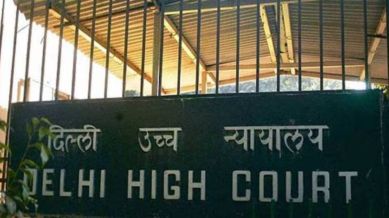Stay updated with the latest - Click here to follow us on Instagram
Delhi HC refuses parole to terror convict diagnosed with cancer, cites security concerns
Mohd Ayoub Mir was convicted in 2004 in an FIR under the stringent Prevention of Terrorism Act (POTA), 2002. Justice Sanjeev Narula said the balance tilts against grant of parole to him in light of “countervailing security concerns” vis-a-vis humanitarian considerations.

Refusing to grant parole to a convict serving a life sentence on terror charges for his cancer treatment, the Delhi High Court recently held that the balance tilts against him in light of “countervailing security concerns” vis-a-vis humanitarian considerations.
Mohd Ayoub Mir was convicted in 2004 in an FIR under the stringent Prevention of Terrorism Act (POTA), 2002. The Supreme Court upheld his conviction in 2007.
Mir, who is lodged in Kot Bhalwal jail in Jammu and receiving treatment at the Government Medical College in the state, sought parole to avail treatment at Sher-i-Kashmir Institute of Medical Sciences, Srinagar, where his family is also located.
Mir sought parole for eight weeks to also address the consequences of the demolition of his family home which has left his dependents in a state of insecurity, and caring for his differently abled daughter.
In an order dated September 23, Justice Sanjeev Narula concluded that the balance tilts against grant of parole to him in light of “countervailing security concerns” vis-a-vis humanitarian considerations. The court took into account the prosecution’s objections.
According to the prosecution, when Mir was enlarged on parole between May 2015 and February 2018, reports furnished by the SHO of Nigeen police station in Srinagar show that he engaged in activities “aimed at instigating local youth to join militant ranks”. Such inputs formed the basis for cancellation of his parole in 2018.
The court also took into account another incident inside Central Jail, Srinagar, in 2018, which resulted in his transfer to Kot Bhalwal Jail, Jammu.
“Taken together with intelligence assessments, these factors indicate a genuine apprehension that if the petitioner is transferred to Srinagar on parole, he may again engage in activities causing disorder,” Justice Narula ruled.
“On a purely humanitarian plane, the long duration of incarceration, coupled with his present ailment, would normally constitute factors that weigh in favour of a limited release on parole… Having regard to humanitarian considerations against the countervailing security concerns, this Court finds that the balance presently tilts against the grant of parole. While prolonged incarceration and medical illness are factors of significance, the credible apprehension articulated by the respondents, based on prior conduct and intelligence inputs, cannot be disregarded. The request for parole is, therefore, declined,” the court reasoned.
The court, however, directed that Mir “shall continue to receive the best possible medical care at Government Medical College, Jammu” and “if a medical board recommends specialised treatment not available in Jammu, the authorities shall facilitate his transfer to an appropriate tertiary centre without delay”.